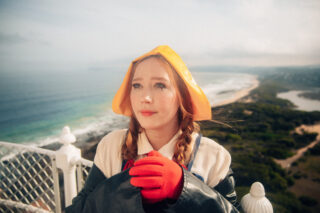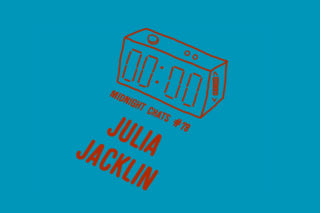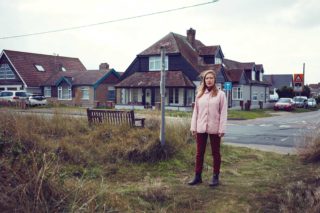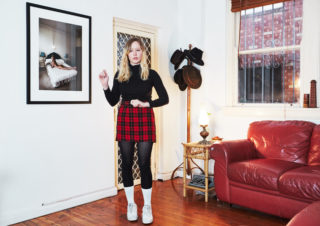
“I’m going to be learning a lot about myself in the next four months.”
Julia Jacklin doesn’t really have a frame of reference for where her fledgling career is headed next. Her debut record, ‘Don’t Let the Kids Win’, is scored through with the idea of failure, and the word ‘idea’ is of crucial importance there. It’s not that the Sydney native truly had reached the end of the road by the time she came to record her album, it’s just that she felt she had.
It’s a feeling that will be by no means unfamiliar to those who’ll be drawn to Jacklin’s music; the idea that you’ve hit your mid-twenties and, suddenly, you’re on the scrap heap. The insidious sense that you must already have let life pass you by, that one way or another you failed to make the necessary jump when you should have done. In Jacklin’s case, it was the jolt of her sister getting engaged that brought into sharp focus the fact that she wasn’t where she wanted to be, at twenty-four years old.
Things hadn’t quite worked out the way she’d perhaps been expecting them to in her late teens and early twenties. Music and songwriting was only ever supposed to be a flirtation; Jacklin’s lifelong ambition, stretching back to childhood, was to grow up to be a social worker. Writing, recording and playing would fall into line as a hobby. At that age, you think you can take the world on. You hit your mid-twenties, and crippling anxiety kicks in. It’s not a new story, but it’s certainly a relatable one.
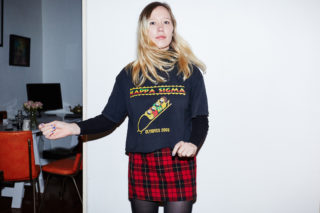
“When I wrote this album,” she says over a Skype call that’s late in Australia and early in Britain, “I hadn’t really been touched by the music industry. Not at that point. I didn’t have a label, or a manager, or a booking agent. Nothing like that. I was very, very fresh, so I guess a lot of songs reflected that central idea. I felt like I was running out of time. I felt like I should have achieved more by this point. I channelled all of that into this group of songs.”
‘Don’t Let the Kids Win’ is a record scored through, from start to finish, with that very specific kind of angst; a collection of songs that plays like a series of snapshots of that precise type of worry, and it’s hard to extricate that existential crisis from the nervous energy that runs through the individual tracks, however sunny they might sound at times. Jacklin reached a crossroads at which she had to decide whether to pursue social work – as she’d always intended to – or turn away from the real world and pursue music full-time.
“The problem was that I didn’t really have any obvious route into music,” she admits. “I finished the album before I had any kind of foot on the ladder. I came home from New Zealand and thought, oh, shit! What happens now? But I ran into a music manager who’d gotten me on a tour with Marlon Williams that year, and I sent him the album, and now he’s my manager. That’s when things started to happen; he got me into South by South West, and I started to understand how everything worked.”
SXSW is one of those strange institutions that seems to increase exponentially, year on year, in terms of both its perceived importance in helping acts break through and also how closely controlled it becomes by sponsors and pre-prepared media interests. Jacklin, happily, managed to come through it without anything in the way of a horror story. “I’m sure good things would’ve happened for me anyway,” she says, before swiftly tempering the uncharacteristic bullishness with a hasty “maybe.”
“It definitely accelerated the process, because you’ve got all these people in the same place, but you know everybody’s probably having a very different individual experience. We were super lucky. We got good slots in good venues, and people actually came to them! We didn’t fuck up too much, I guess. You hear about that – people having nightmarish shows with technical problems or whatever – but we were good. Which was nice.”
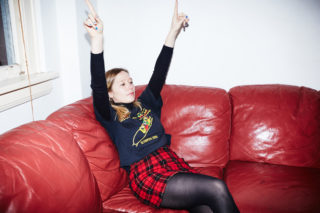
Jacklin lives and operates out of the inner-western Sydney suburb of Glebe, where she spent her post-university years working a mundane day job on a production line, at a factory that turns out essential oils. It was that good, old-fashioned manual graft, though, that lent her the strength of conviction to record her first full-length record on her own terms, rather than just cutting tracks in her garage, as had previously been the modus operandi.
“I really liked this record by a girl from New Zealand called Aldous Harding,” she explains, “so I looked into who it was that recorded her, and he turned out to be really affordable.” Ben Edwards was the man in question, and Jacklin promptly decamped to his sitting room studio in Christchurch. “I just lived at his house for a month. I guess it sounds like a little bit of a stretch for my first album, but New Zealand is my favourite place in the world, and I’d worked very hard at a very shitty job for a very long time to get there, so I thought, why not? – I felt like I’d earned it.”
Not that, by the end of that four-week stretch, Jacklin was totally happy with the finished product. “It took a long time to get my head around,” she laughs. “We had to re-do one of the songs when we got back home, and I’m still not fully sold on the record. I mean, I love it, but I just can’t imagine that anyone ever finishes an album and feels like, ‘oh, yeah! This is definitely ready for the world to listen to!’ At some point, you have to draw the line. You could carry on tweaking and making adjustments for the rest of your life.”
As is always the case, the Internet reaction to Jacklin’s releases so far has been awash with references to her obvious musical touch points; her offbeat lyrical style recalls Fiona Apple, as does her delivery, which has a tendency to tilt from matter-of-fact one minute to borderline operatic the next. Sharp-eared listeners have also pointed out a similarity to fellow indie darling Angel Olsen, with direct parallels drawn between ‘Unfucktheworld’ and Jacklin’s ‘Pool Party’. “They’re both big influences, one hundred per cent,” says Jacklin unashamedly. “I think I’m a pretty straightforward writer. If I was the sort of person who wrote knowing in their head that they were working towards a record, then things might be more structured, but these songs were just kind of written on and off at uni. I never really tried to shut myself off from the music I loved. I definitely wear my influences on my sleeve, and that’s a huge part of folk music; listening to people who are better than you, and trying to see what it was they did that was so cool. Once you’ve figured it out, you can put your own spin on it.”
With ‘Don’t Let the Kids Win’ out in October (via Transgressive Records), the focus for Jacklin now turns to going out on the road in support of it. As somebody who stumbled into the industry at what, as far as she was concerned, was the eleventh hour, it’s an arena that still feels pretty new to her. “It’s not that I’ve not travelled a lot,” she says. “I’ve done plenty of that. Ever since high school, really; going off and wandering, travelling and being lost in your early twenties. Like a lot of other people, I did do that.”
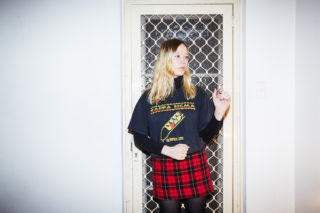
The rigours of the road, of course, will serve up a different scenario entirely. Jacklin has made it over to the UK already (she played a clutch of shows at The Great Escape back in May, and made it up to Leeds and Liverpool around the same time) but once she wraps up an extensive North American jaunt in the early Autumn, she’ll return to the UK having landed a plum support gig – opening for men-of-the-moment Whitney on their November run. The pairing makes total sense, once you hear how Jacklin too is offering us a new, un-stuffy take on country music.
“We’re going to be out with a full band on that European tour. I’ve never really done this kind of touring,” she says, “where it’s going to be relentless, and where I’ll be singing night after night, and where I’m gonna need to figure out how to best preserve my voice – it’s things like that I’m worrying about. As long as I can make it past the first two weeks, I think it’ll all be good. I hope so, anyway.”




